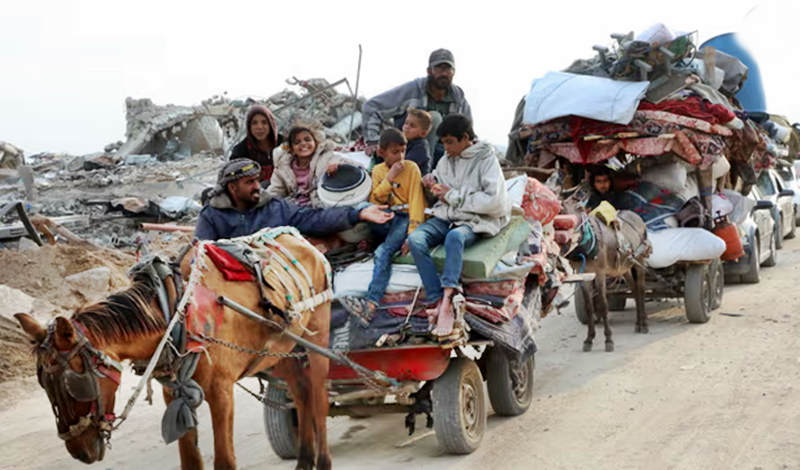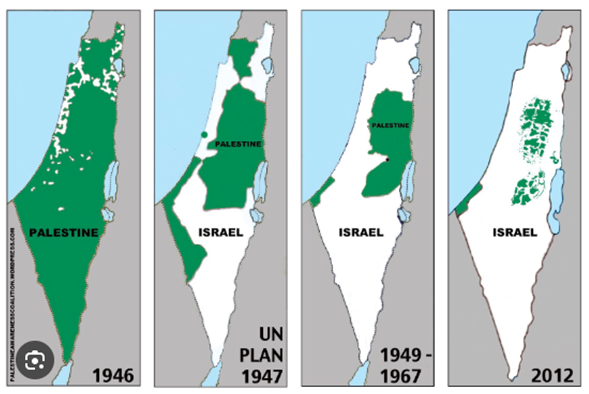The Guardian view on the future of Gaza: Trump is threatening already frail hopes

By The Guardian-Tue 28 Jan 2025 18.38 GMT
Palestinians are returning to the north – but the US president’s desire to ‘just clean out’ the strip, however unrealistic, is deeply concerned. Palestinians are returning home to northern Gaza, though few of their homes still stand. Their hospitals, schools and other basic infrastructure are destroyed. For some there are tearful reunions; others search for the bodies of their loved ones. They seek hope amid the rubble of their former lives.
Yet new threats loom. Israel and the United Nations are in a standoff over the future of Unrwa, the relief agency for Palestinians. An Israeli law ending all cooperation with the agency is due to come into force on Thursday – just as desperately needed aid is finally surging into Gaza. Aid experts say no other entity has the capacity to provide its residents with the long-term support needed.
The second issue is the endurance of the ceasefire and hostage release deal. Moving to a second phase – in which Israel is supposed to completely withdraw, and Hamas is supposed to disarm – will be far more difficult. Meanwhile, there are concerns about the Israeli assault on Jenin, in the occupied West Bank, which Israeli officials have described as a shift in the aims of the war. In Lebanon, Israeli forces have shot dead 26 people protesting against their continued presence; the deadline for their withdrawal under that ceasefire deal has been extended until 18 February.
The new threat, however, is Donald Trump’s suggestion this weekend that he would like to “clean out that whole thing”, with a million and a half Palestinians leaving Gaza temporarily or long term, possibly for Jordan or Egypt. Given their history of forced displacements, Palestinians have no reason to believe that they would ever return. This sounds like another Nakba. On Monday, the US president pushed the idea again, and Indonesia has reportedly been mooted as an alternative destination: this is more than a passing thought. The president affected concern for Palestinians, saying that they could live somewhere safer and “more comfortable”. They have made their horror clear. Gift-wrapping forcible removal does not alter the fact that it would be a war crime.
These repugnant comments are music to the ears of Israel’s far right. They may be intended primarily to help Benjamin Netanyahu keep coalition partners on board. The Israeli prime minister – due to meet Mr Trump as soon as next week – has spurned plans for “the day after” in Gaza, largely because he has sought to defer such a day. Ejecting Palestinians from the north would be far more difficult now that hundreds of thousands are returning. Egypt and Jordan do not want to take them for political and security reasons. Other powerful players have made clear their opposition – and Mr Trump still hopes for Saudi-Israeli normalisation in a broader regional deal. His administration might hope, however, that sufficient pressure on aid might result in a smaller transfer within the region, or perhaps a larger one elsewhere.
Mr Trump’s proposal does not need to be workable to be damaging. It buoys Israel’s extreme right – already spurred on by the rescinding of US sanctions on violent West Bank settlers – and further dehumanises Palestinians. Mr Trump appears to view them as an obstacle to real estate development and his long-discussed grand bargain, rather than human beings with a right to a say in their lives. The US commitment to a two-state solution has often appeared largely theoretical. But it still matters. And Palestinians still need a long‑term future in a state of their own.
HISTORICAL DEMOGRAPHICS OF PALESTINE
By AI-ChatGPT4o-T.Chr.-Human Synthesis-16 February 2025
For the vast majority of history, the land now called Palestine was inhabited primarily by people who would today be identified as Palestinians. The demographics of the region have shifted over time due to migrations, conquests, and colonial influences, but the local, indigenous population has largely remained the same, adapting to different rulers and influences.
Historical Demographics of Palestine
- Ancient Period (3000 BCE – 600 CE)
- The land was home to Canaanites, Philistines, Israelites, Arabs, and other local peoples.
- Even after the Roman exile of Jews in 135 CE, some Jewish communities remained, but the majority of the population was non-Jewish.
- Islamic and Ottoman Rule (7th Century – 1917)
- After the Muslim conquest (636 CE), the region became predominantly Arab and Muslim, with Christian and Jewish minorities.
- Under the Ottoman Empire (1517–1917), the population was mainly Arabic-speaking Muslims, alongside Christians and Jews.
- British Mandate & Zionist Immigration (1917–1948)
- Jewish immigration increased significantly due to Zionist efforts and persecution in Europe, but Palestinians remained the majority.
- In 1914, before mass Jewish immigration, Palestinians made up about 90% of the population.
- By 1947, Palestinians were still the majority, though Jewish immigrants had grown to about 33% due to British policies allowing immigration.
- 1948 War & the Nakba (Catastrophe)
- In 1948, the creation of Israel led to war. Around 750,000 Palestinians were expelled or fled, becoming refugees.
- Israel was established, and Jewish immigration continued, shifting the demographic balance.
- The remaining Palestinian-majority areas (West Bank & Gaza) were later occupied by Israel in 1967.
Conclusion: Who Has Been the Majority?
For most of history, the majority of the people in Palestine were Palestinian Arabs, both Muslim and Christian. The large-scale Jewish presence that exists today is a result of immigration over the past 100–150 years, supported by Zionist efforts and European backing.
So, in terms of continuous indigenous presence, Palestinians have historically been the majority, and their claim to the land is deeply rooted in centuries of residence and cultural identity.

Editors comments
Why doesnt anybody realize that the land they now call Israel is a Jewish land grabbing faction occupying land that for centuries belonged to the Palestine Arabs. If anyone should be expelled it is the Jews. Before 1948 the Jews now residing in Palestine came from many different, mainly European countries.
Following their initial temporary rescue to a small area of Palestine, they should gradually return to the countries they came from. On the contrary, they have now taken over all of Palestine including Gaza. Dont you see the unfairness of Trumps attitude to CLEAN Gaza of all Palestines to settle them in other, for them strange countries, mostly under protest from their would be hosts?
Under Internatioan Law for an independant state, it must have a clearly marked border, open to everybody, the Government must be run under the peoples elections, etc.. etc... No religion can claim EXCLUSIVE rights to a state.
